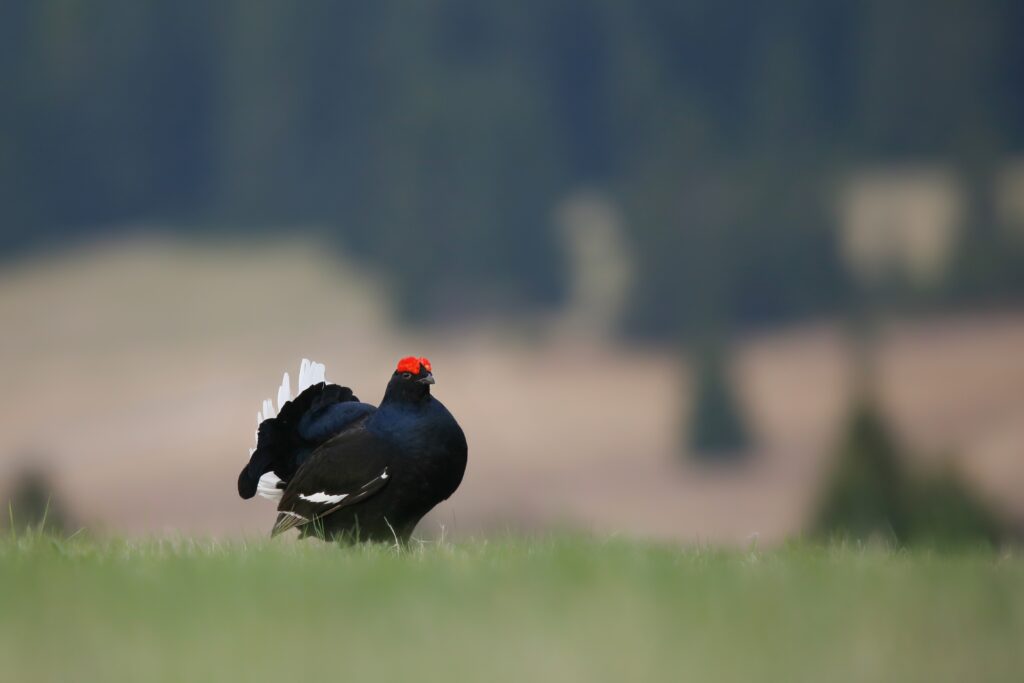
Why is it necessary to help the black grouse?
The black grouse (Lyrurus tetrix) is a species from the grouse family that occurs throughout the whole northern Europe. In other parts of the European continent, isolated populations are formed mainly in higher altitudes, especially in the Alps. Even in the Czech Republic, residual populations occur mainly in higher altitudes, mostly in the Ore Mountains, the Šumava Mountains and the Giant Mountains. Black grouse often looks for localities in the successional stage of forest stands, with herbaceous layer rich in cranberries, blueberries or heather. These plants are an important source of fodder for adults and provide suitable shelter from predators for chickens. At the same time, the mentioned habitats provide various species of insects, which is an essential food component for chickens in the first 14 days after hatching. In places of occurrence where these suitable habitats are missing, the black grouse is also forced to inhabit meadows, pastures, or forest stands with open clearings. However, if a dense tree layer is present, the habitat becomes unsuitable. Probably the most significant reason for the dramatic decline in the numbers of black grouse in the Czech Republic is the loss of suitable habitats, which is closely related to changes in the character of the whole landscape. As an example, the large clearings in the mountainous regions of the northern to north-eastern part of the Czech Republic after the air pollution calamity in the 1970s, which have grown over and gradually lost their importance for black grouse could be mentioned. Also, many originally suitable sites were transformed during the second half of the 20th century by timber-oriented management in commercial forests. Suitable primary habitats, which were mainly peat bogs, have in many cases been drained in the past and converted into forests or grasslands. Another important factor is the considerable effect of tourism, which negatively affects black grouse populations especially during the nesting period. Related sources of negative effects are, in particular, operation of ski lifts, modification and use of cross-country trails, ski mountaineering or freeriding (free skiing through forests outside the ski slopes), which is often done illegally. Not only on the basis of the mentioned factors, there is a continuous decline in abundance of black grouse in the Czech Republic, which in some areas, including the Doupov Mountains, is approaching the limit of sustainability of the local population. At this time, we have one of the last chances of preserving this majestic representative of grouse family in the Czech nature for future generations.
The project
The project is focused on the support and stabilization of the residual population of black grouse in the Doupov Mountains. The support is implemented by a mosaic-like opening of overgrown habitats. This management measure, which will focus on the removal of successive vegetation, will create open areas suitable for the lekking and nesting of black grouse. By removing the shrub and woody layer, habitats suitable for predators of nests and adult grouses, such as red foxes or the rock martens, will be limited.
The project is implemented in cooperation with the Research Institute of Forestry and Hunting, v.v.i. and the state enterprise Military Forests and Estates.
Project team
Forestry and Game Management Research Institute:
Ing. Lucie Hambálková – Project leader
Ing. Jan Cukor, Ph. D. – Expert, project researcher
Ing. Jana Danysová – Project management, financial management
Nature Conservation Agency of the Czech Republic:
Bc. Vít Tejrovský – Expert, researcher, zoologist
Military Forests and Estates of the Czech Republic, division Karlovy Vary:
JUDr. Jiří Kšica – Director
Ing. Ladislav Novotný – Head of Services Administration
Ing. Petra Kutnohorská – Financial management of the project
Ing. Markéta Máchová – Project management
employees of the Services department – technical implementation of habitat management
Norwegian Institute for Nature Research:
Lasse Frost Eriksen – Expert, consultatnt, zoologist
Oddgeir Andersen – Expert, consultatnt, zoologist
